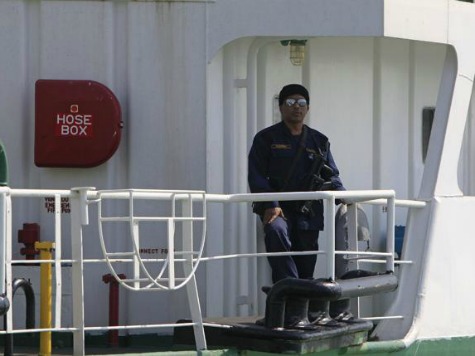
This morning’s key headlines from GenerationalDynamics.com
- Saudis push to avoid MERS outbreak as Hajj approaches
- Pakistan’s umbrella Taliban group appears to be disintegrating
- The center of international piracy moves from Somalia to Singapore
Saudis push to avoid MERS outbreak as Hajj approaches
With millions of Muslims from around the world about to arrive inMecca, Saudi Arabia, for their once in a lifetime Hajj pilgrimage onOctober 2-7, Saudi officials are pushing hard to prevent an outbreakof MERS-CoV (the Middle Eastern Respiratory Syndrome coronavirus).There is particular sensitivity this year, as the Ebola virus spreadsout of control in Western Africa. Crowded Hajj events are the perfectvenues for one infected person to spread MERS to several other people,causing a chain reaction.
Since the first cases of MERS were identified in 2012, there have been855 cases and 333 deaths, with a 40% death rate. However, MERSapparently is more difficult to spread than Ebola, as most of the MERSdeaths have been health care workers, or others who caught it inhospitals.
The “reservoir” for the MERS virus appears to be camels. Camels carrythe virus but are not sickened by it, and can pass the virus tohumans, who DO become sickened by it.
Saudi officials have for several months been on a massive educationcampaign, particularly targeting thousands of health care workers.Saudi health officials say they have beefed up their response to theoutbreak, with better infection control in hospitals and improvedsurveillance systems such as a new Command and Control Centre inJeddah, which can coordinate swift isolation and treatment of newcases to prevent spread. Arab News and BBC
Pakistan’s umbrella Taliban group appears to be disintegrating
On Monday, the Baitullah Mehsud faction of the Pakistan Talibanumbrella group Tehrik-e-Taliban (TTP) became the fourth factionrecently to announce its separation from TTP. The apparentdisintegration of TTP isn’t necessarily good news, as it means thatthe individual ethnic terrorist groups within TTP are going tocontinue individually. Factional fighting within the TTP began inNovember 2011, when an American drone strike killed TTP leaderHakimullah Mehsud. In an attempt to reunite the factions, the TTPpulled off a spectacular attack on Karachi airport in June of this year, claiming that was revenge forthe drone strike that killed Mehsud. However, that attack backfiredsince, for the first time, Pakistan’s army finally launched anoperation, known as Zarb-e-Azb, on North Waziristan in Pakistan’stribal area to “clean out” the Taliban’s hideouts and weapons stores.
The new faction has declared extortion, abduction for ransom, andbombing public places as Haram (any act that is forbidden by Allah).conspirators have infiltrated it,” according to a spokesman.
It was just three weeks ago that another group of factions broke offfrom TTP, and called itself Jamaat-ul-Ahrar (JuA, Assembly ofFreedom). The leader, Maulana Qasim Omar Khorasani, had been stronglyopposed by the “peace talks,” earlier this year, between TTP andPakistan’s prime minister Nawaz Sharif. In a statement last Februaryleading up to the split, a spokesman said:
Some of our leaders have become prey to compromisesand have agreed to conduct dialogue only to get the tribal areasliberated. It is very clear that Shariah can never be attainedthrough talks. Even if the Government makes a concession, it willonly be limited to the tribal areas. In the past, we used toparticipate in jihad [Holy war] from the platform ofTehrik-e-Taliban. But from now onwards, we will carry out attacksindependently. The Mujahideen associated with the TTP are ourbrothers, but if they opt for a ceasefire with the Government, weshall not be bound by their agreement, nor are we willing toaccept such a ceasefire.
Following the split, a spokesman claimed, “It was lack of leadershipquality that TTP had been involved in bloody clashes that have takenlives of known Mujahideen. The leadership had no policy to deal withthis situation.” Samaa TV (Pakistan) and South Asia Terrorism Portal (SATP – India)
The center of international piracy moves from Somalia to Singapore
The changing nature of piracy has changed it from a multi-milliondollar industry pursued by Somali warlords off the horn of Africa to abillion dollar industry pursued by commercial pirates in the seas ofthe Singapore Strait and Strait of Malacca.
Five years ago, pirate attacks off the horn of Africa had becomefairly common. Pirates would board ships and hold the crews formulti-million dollar ransoms. But thanks to a multinational militaryeffort and merchant crew training, the number of such attacks wasreduced to 13 last year from 197 in 2009.
But the sheer number of merchant ships at sea, roughly 55,000, makes asimilar approach impossible with the pirates of southern Asia. Thesepirates almost never seize hostages. Instead, they board the ship,tie up the crew, smash the communications and navigation equipment,and then get down to work — stealing the cargo, which is usually gasor oil. The pirates bring their own tankers and siphon the oil or gasto their own ship. A typical haul for a few hours work is half amillion dollars. CNBC
KEYS: Generational Dynamics, Saudi Arabia, Hajj, camels,Middle Eastern Respiratory Syndrome coronavirus, MERS-CoV,Pakistan, Tehrik-e-Taliban, TTP, Pakistan Taliban, Hakimullah Mehsud,Zarb-e-Azb, North Waziristan, Nawaz Sharif,Jamaat-ul-Ahrar, JuA, Assembly of Freedom, Maulana Qasim Omar Khorasani,Somalia, Singapore Strait, Strait of Malacca, piracy

COMMENTS
Please let us know if you're having issues with commenting.